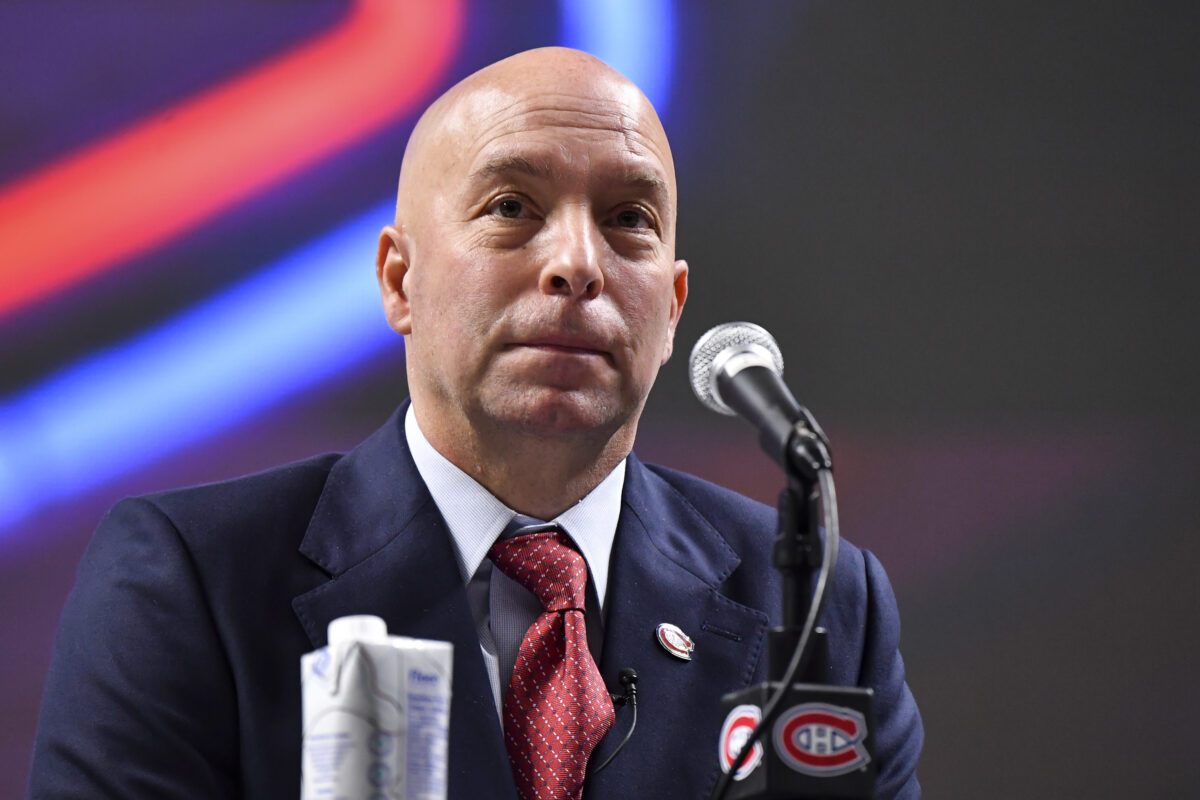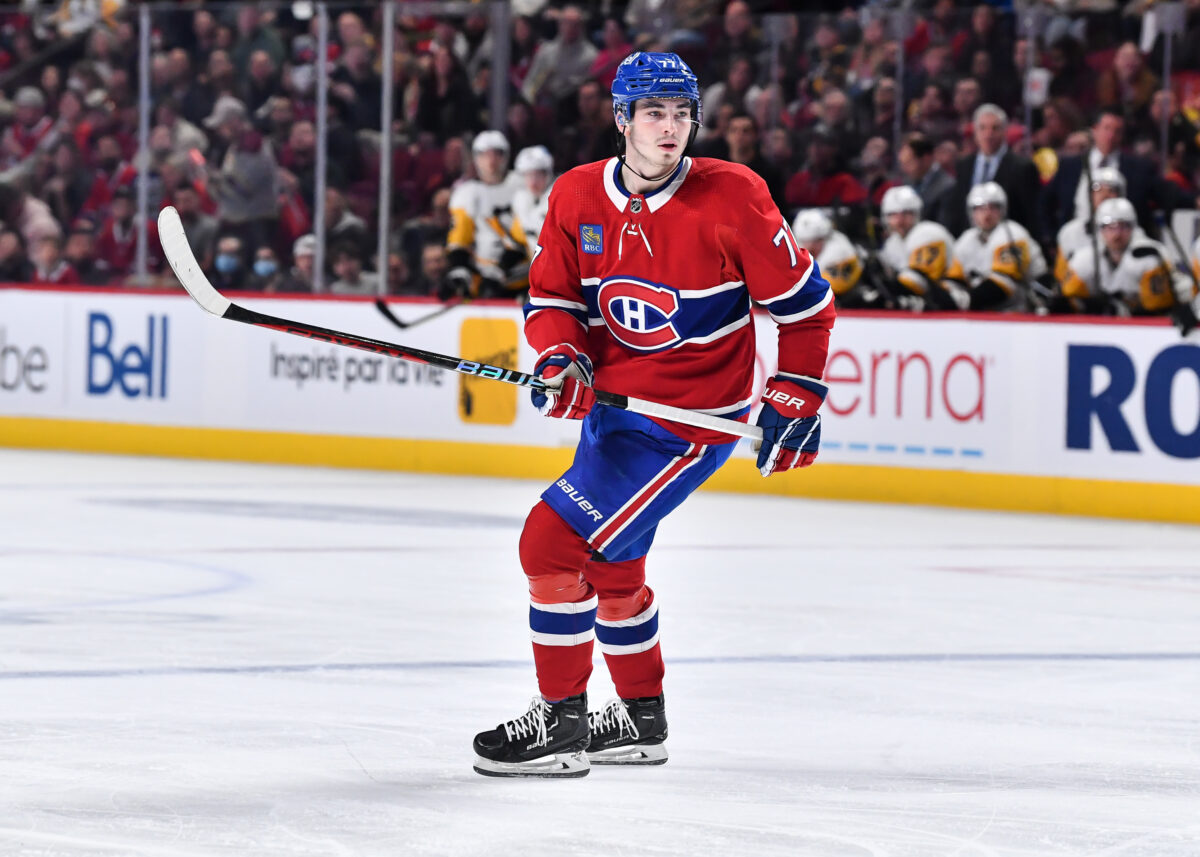The Montreal Canadiens’ season is coming to an end, mercifully. After embracing general manager (GM) Kent Hughes’ rebuild, they knew that the playoffs would not be possible. They now rank in the bottom five of the standings and have a legitimate chance at winning the draft lottery for Connor Bedard. According to the usual standards of success, this was not a successful season for Montreal.
But they are in a rebuild, and that means that expectations are not the same as in a normal season. Because of that, they need a different standard for determining accomplished goals. By breaking down management, coaching, and the players, we will see if they have had any success as an organization.
Canadiens Off the Ice
The management team, led by Hughes and executive vice president Jeff Gorton, has been very busy since their arrival, especially over the last year. More than making trades and signing players, they had to modernize the franchise’s hockey operations. On that front, they were successful and set the foundation for the rebuild.

The Canadiens had to expand and change their approach to player development. Hiring Adam Nicolas has not only modernized the department but also made it possible to take chances on reclamation projects or reach on a late-round draft pick. Tailoring individual development takes many long hours, but it doesn’t go unnoticed by the players, especially the leaps forward taken by prospects like Lane Hutson.
The analytics department was also a black hole under the last regime. Partly because there was little to no knowledge of who was doing the work or if former GM Marc Bergevin used any analytics at all in any aspect of his job. Under Hughes, that has changed. The Canadiens went from the bottom tier in the NHL to among the top organizations in terms of investment in and use of analytics. They hired Christopher Boucher, formerly of Sportlogiq, to head the department and hired a staff to help provide information not just for on-ice adjustments but also to help in player development and even at the draft table.
Related: 2023 NHL Draft: Will Smith, Skilled and Driven
The mountain of injuries is a major problem. However, despite the training staff being somewhat unfairly criticized for their training and treatment of players, there is a silver lining. The massive list of injuries provided many new opportunities for young players and showcased the team as a free-agent destination as management keeps their word to reward hard work.
Players now see the Canadiens as a team that will give players a chance, not only if they put up points but put in the work to fill less glamourous roles. That could not have been said about the team in the past. This season, at 31 years old, Alex Belzile finally got a legitimate opportunity, scoring his first NHL goal on his way to six goals and 14 points in 31 games with the Habs, and his perseverance earned him a Masterton Trophy nomination. Whether he remains in Montreal or not, what he showed this season should allow him to continue his NHL career.
Canadiens On the Ice
The Canadiens led the NHL in man games lost in 2022-23 with 657 games, saw half a dozen season-ending injuries, and they dressed 38 different players for at least one game; only one of those 38, Nick Suzuki, played in all games and 14 were rookies, including five defensemen.
However, the future looks good, thanks in large part to the progression of several of those young players. First, Arber Xhekaj has gone from undrafted to a third-pairing mobile defenceman who can intimidate physically. Kaiden Guhle has shown he can play a complementary role on a top pairing, and Kirby Dach, who was cast aside by the Chicago Blackhawks, became an integral part of the Habs’ future.

Head coach Martin St. Louis began his first season without the interim tag attached to his role, and like management, he came in hoping to modernize the approach to coaching within the organization. Past coaches like Michel Therien and Claude Julien were the epitome of “old school” and dictated that approach in every aspect. Dominique Ducharme was part of a new breed of coaches but was too rigid in his systems.
On the other hand, St. Louis had no professional experience as a head coach but had a long playing career and a vision of how to approach the role. He focuses on two-way communication with players and patience in allowing young players to make mistakes and learn from them without fear of reprisal. He preached process over outcome to build good habits that are the foundation of good play. In particular, he focuses on offense and has the ability to adjust his plans.
The power play is a good example, improving from 15% in the first half of the season to 18.5% over the second half, despite using as many as 12 replacements in any game. Most of all, however, St. Louis was able to keep the team competitive all season, fueling their combative nature that allowed the team to keep competing every night despite the injuries or being outmatched in overall skill.
Determining success always boils down to expectations. Compared to a Stanley Cup contender, this season was an unmitigated disaster. But becoming a contender is the end goal of this process. Compared to a team in a rebuild, the Canadiens’ successes are seen in the approach to the process. In creating departments that offer the tools necessary to draft and develop well, then providing optimal opportunities to thrive, the 2022-23 season should be seen as successful. This past season should provide fans some hope that they are witnessing their team follow the same blueprint that other clubs have followed to win in the salary cap era.